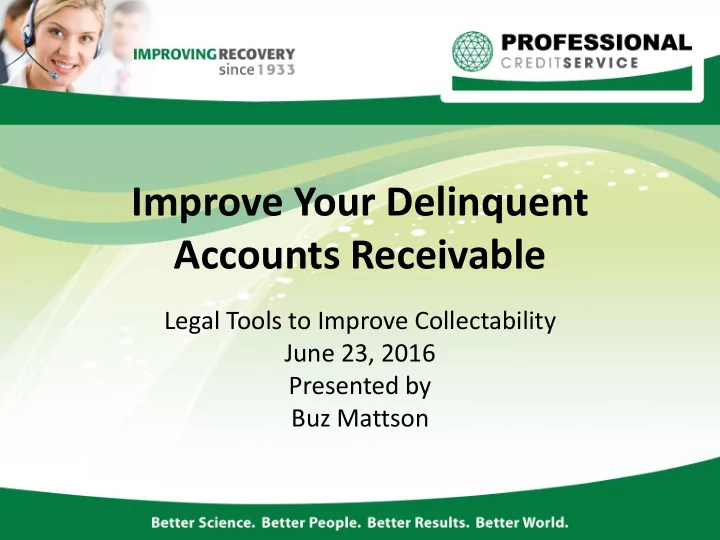

Improve Your Delinquent Accounts Receivable Legal Tools to Improve Collectability June 23, 2016 Presented by Buz Mattson
Presenters Floyd ‘Buz’ Mattson Chief Litigation Counsel for Professional Credit Service, Buz is responsible for the collections through the litigation process at Professional. He is admitted to practice law in Oregon, Washington, Alaska, Utah and Colorado and with 5 Native American Tribes. He also serves as the leader of four staff attorneys admitted to practice law in Oregon, Washington, California, Idaho and Nevada.
Legal Disclaimer This information is not intended as legal advice and may not be used as legal advice. Legal advice must be tailored to the specific circumstances of each individual case. Every effort has been made to make sure this information is up-to-date as of today’s date. This presentation is not intended to be a full and exhaustive explanation of the law in any area, nor should it be used to replace the advice of your own attorney. 3
Today’s Goals Let you know about legal methods that increase collectability. Teach you how you can put your account into proper status for legal methods. Get done early – answer questions 4
WHY ARE WE HERE? ORS 293.229 Legislative Fiscal Office – Report on Liquidated and Delinquent Accounts Receivable; June 30, 2015. ACCOUNTS VALUE 1. Beginning Balance 2,533,860 $ 3,191,576,187 2. Additions: 648,661 $805,849,038 3. Collections: 0 ($ 431,621,133) 4. Accounts Closed: (379,887) ‐ 5. Write‐Off's: (75,542) ($ 131,239,175) 6. Adjustments: 0 ($ 206,658,460) 7. Reversals: (404,550) ($ 131,782,425) 8. Ending Balance 2,322,542 $ 3,096,124,032 5
FIRST THINGS FIRST! • Two of the biggest factors of the collectability of an account are addressed in SB 55-The Omnibus Collections Bill. • The age of the account • The data available to improve collections • A side benefit is making the “invisible” visible — so we can all be more effective. 6
SB 55 • SB 55-The Omnibus Collections Bill, passed during the Oregon Legislature’s 2015 regular session and implements important new guidelines which allow both state agencies and outside collection agencies to more effectively collect delinquent debt. • The provisions provided direction on… 7
SB 55 • Granting permission for state agencies to securely share the SSN affiliated with a delinquent account to private collection agencies. • Allowing the Oregon Department of Revenue and private agencies to propose and accept settlement offers on debts owned by state agencies. • Requiring state agencies to include a statement identifying any debt older than 90 days when reporting annually to LFO. 8
SB 55 • Allowing state agencies to add a fee to the delinquent debt to be paid by the consumer, reducing overhead costs to the agency. • Whether the account is sent to DOR or PCA • Holding state agencies responsible for making reasonable efforts to collect liquidated and delinquent accounts. • Requiring DAS to monitor state agency collection functions and assist state agencies to improve the collection of delinquent debt. 9
SB 55 (ORS 293.231 (1) – (4)) • At your Agency (certain exceptions apply): • If 90 days without a payment, then must refer to either: • Other Agency Accounts (“OAA)”, or • Private Collection Agency (or earlier, you decide) • If at OAA and six months without a payment, then must refer to a Private Collection Agency [This change will result in greater liquidation] 10
IMPORTANCE OF DATA Good Data Increase in Recovery* Name, Address Name, Address, SSN 10x Name, Address, SSN, Employment 15x Name, Address, SSN, Employment, License, 56x Phone Number *Up to this value over having only the Name and Address 11
IMPORTANCE OF “CAN’T” OR “WON’T” PAY • Most relevant for those agencies that have a viable legal program • “Can’t” typically changes over time – but the question is how long. • “Won’t” typically doesn’t change over time. 12
“LEGAL” COLLECTIONS • What is it? • Using the judicial system to transfer the property of a consumer/obligor to the creditor. • Constitution – cannot deprive a person of liberty or property without DUE PROCESS. 13
DUE PROCESS • Notice; and • Opportunity to defend • Achieving Due Process • Court • Administrative proceedings • Results • Judgment (ORS Ch. 18) • Final Order (ORS Ch. 205) • Warrants (DOR & ORS Ch. 293) 14
ORS 205.125; 205.126 • Recording a final order or a warrant in the county lien records • THEN filing that recorded final order in the Circuit Court transforms the final order or warrant into a garnishable judgment. • PCS staff attorney authorized as Oregon Special Assistant Attorney General on behalf of state agencies • Agencies presently authorized – • Construction Contractors Board • Water Resources Board • Board of Chiropractic Examiners • Real Estate Board 15
ORS 18.605 DEBTS SUBJECT TO GARNISHMENT; WHEN WRIT MAY BE ISSUED ON DEBT (1)(d) Monetary obligations imposed under agency orders or warrants recorded pursuant to law in the county lien records. (2)(d) A writ may be issued for a monetary obligation based on an agency order or warrant after the order or warrant is recorded in the County Clerk Lien Record. 16
GARNISHMENT • Garnishment (ORS Ch. 18) • Need an asset. Don’t want to spend the funds its costs speculatively. It gets expensive. • Assets • Employment – the best asset; resources • Data Vendors • Future legislative possibilities • Bank account • Lien – real property • Personal property seizure and sale 17
DATA VENDORS Data Vendors provide consumer data to financial firms, traders, and investors. The data is collected from a wide variety of sources such as employers, regulatory filings, court filings, pizza delivery, utilities, (truly a very wide source of data sources, and managed under tight government controls). 18
Thank You! Buz Mattson bmattson@professionalcredit.com
Recommend
More recommend